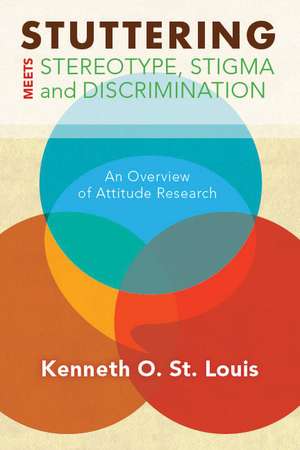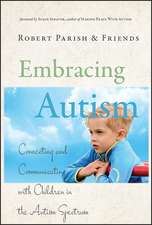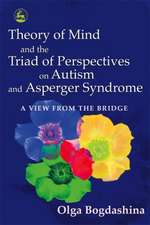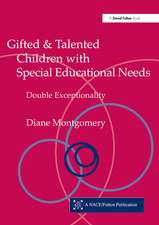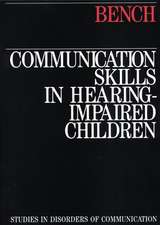Stuttering Meets Sterotype, Stigma, and Discrimination: An Overview of Attitude Research: WVU Books
Autor Kenneth O. St. Louis Cuvânt înainte de Glen Tellisen Limba Engleză Paperback – mar 2015
More than a century of research has sought to identify the causes of stuttering, describe its nature, and enhance its clinical treatment. By contrast, studies directly focused upon public and professional attitudes toward stuttering began in the 1970s. Recent work has taken this research to new levels, including the development of standard attitude measures; addressing the widely reported phenomena of teasing, bullying, and discrimination against people who stutter; and attempting to change public opinion toward stuttering to more accepting and sensitive levels.
Stuttering Meets Stereotype, Stigma, and Discrimination: An Overview of Attitude Research is the only reference work to date devoted entirely to the topic of stuttering attitudes. It features comprehensive review chapters by St. Louis, Boyle and Blood, Gabel, Langevin, and Abdalla; an annotated bibliography by Hughes; and experimental studies by other seasoned and new researchers. The book leads the reader through a maze of research efforts, emerging with a clear understanding of the important issues involved and ideas of where to go next. Importantly, the evidence base for stuttering attitude research extends beyond research in this fluency disorder to such areas as mental illness, obesity, and race. Thus, although of interest primarily to those who work, interact, or otherwise deal with stuttering, the book has potential for increasing understanding, ameliorating negative attitudes, and informing research on any of a host of other stigmatized conditions.
Stuttering Meets Stereotype, Stigma, and Discrimination: An Overview of Attitude Research is the only reference work to date devoted entirely to the topic of stuttering attitudes. It features comprehensive review chapters by St. Louis, Boyle and Blood, Gabel, Langevin, and Abdalla; an annotated bibliography by Hughes; and experimental studies by other seasoned and new researchers. The book leads the reader through a maze of research efforts, emerging with a clear understanding of the important issues involved and ideas of where to go next. Importantly, the evidence base for stuttering attitude research extends beyond research in this fluency disorder to such areas as mental illness, obesity, and race. Thus, although of interest primarily to those who work, interact, or otherwise deal with stuttering, the book has potential for increasing understanding, ameliorating negative attitudes, and informing research on any of a host of other stigmatized conditions.
| Toate formatele și edițiile | Preț | Express |
|---|---|---|
| Paperback (1) | 336.23 lei 3-5 săpt. | |
| West Virginia University Press – mar 2015 | 336.23 lei 3-5 săpt. | |
| Hardback (1) | 572.95 lei 3-5 săpt. | |
| West Virginia University Press – 28 feb 2015 | 572.95 lei 3-5 săpt. |
Preț: 336.23 lei
Nou
Puncte Express: 504
Preț estimativ în valută:
64.34€ • 67.04$ • 53.27£
64.34€ • 67.04$ • 53.27£
Carte disponibilă
Livrare economică 13-27 martie
Preluare comenzi: 021 569.72.76
Specificații
ISBN-13: 9781940425399
ISBN-10: 1940425395
Pagini: 384
Dimensiuni: 152 x 229 x 25 mm
Greutate: 0.59 kg
Ediția:1st Edition
Editura: West Virginia University Press
Colecția West Virginia University
Seria WVU Books
ISBN-10: 1940425395
Pagini: 384
Dimensiuni: 152 x 229 x 25 mm
Greutate: 0.59 kg
Ediția:1st Edition
Editura: West Virginia University Press
Colecția West Virginia University
Seria WVU Books
Notă biografică
Kenneth O. St. Louis is a professor in the Department of Communication Sciences & Disorders at West Virginia University with 40 years of experience in teaching, treating, and researching fluency disorders. St. Louis is a cofounder of the International Fluency Association and the International Cluttering Association, with recognitions of ASHA Fellowship, the Deso Weiss Award for Excellence in cluttering, WVU’s Benedum Distinguished Scholar Award, and WVU’s Heebink Award for Outstanding Service to the State of West Virginia. In 1999, he founded the International Project on Attitudes Toward Human Attributes and has collaborated with numerous colleagues internationally on measuring public attitudes toward stuttering.
Textul de pe ultima copertă
More than a century of research has sought to identify the causes of stuttering, describe its nature, and enhance its clinical treatment. By contrast, studies directly focused upon public and professional attitudes toward stuttering began in the 1970s. Recent work has taken this research to new levels, including the development of standard attitude measures; addressing the widely reported phenomena of teasing, bullying, and discrimination against people who stutter; and attempting to change public opinion toward stuttering to more accepting and sensitive levels.
Stuttering Meets Stereotype, Stigma, and Discrimination: An Overview of Attitude Research is the only reference work to date devoted entirely to the topic of stuttering attitudes. It features comprehensive review chapters by St. Louis, Boyle and Blood, Gabel, Langevin, and Abdalla; an annotated bibliography by Hughes; and experimental studies by other seasoned and new researchers. The book leads the reader through a maze of research efforts, emerging with a clear understanding of the important issues involved and ideas of where to go next. Importantly, the evidence base for stuttering attitude research extends beyond research in this fluency disorder to such areas as mental illness, obesity, and race. Thus, although of interest primarily to those who work, interact, or otherwise deal with stuttering, the book has potential for increasing understanding, ameliorating negative attitudes, and informing research on any of a host of other stigmatized conditions.
Stuttering Meets Stereotype, Stigma, and Discrimination: An Overview of Attitude Research is the only reference work to date devoted entirely to the topic of stuttering attitudes. It features comprehensive review chapters by St. Louis, Boyle and Blood, Gabel, Langevin, and Abdalla; an annotated bibliography by Hughes; and experimental studies by other seasoned and new researchers. The book leads the reader through a maze of research efforts, emerging with a clear understanding of the important issues involved and ideas of where to go next. Importantly, the evidence base for stuttering attitude research extends beyond research in this fluency disorder to such areas as mental illness, obesity, and race. Thus, although of interest primarily to those who work, interact, or otherwise deal with stuttering, the book has potential for increasing understanding, ameliorating negative attitudes, and informing research on any of a host of other stigmatized conditions.
